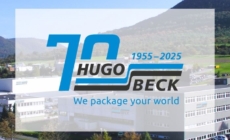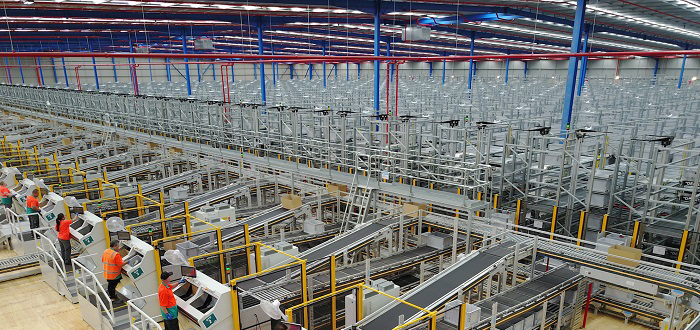-
Nutrivend selects Forterro’s Orderwise to support online expansion and streamline operations - April 11, 2025
-
ARROWXL LAUNCHES AMBITIOUS ZERO WASTE ROADMAP - April 8, 2025
-
THE BCMPA’S NEW CAMPAIGN DRIVES OUTSOURCING SUCCESS IN Q1 - April 7, 2025
-
BLACKOUT TECHNOLOGIES TARGETS TELEMATICS-INTEGRATED MOBILE DEVICE BLOCKING TO COMBAT SMARTPHONE DISTRACTION - April 1, 2025
-
OpenADR Alliance announces first OpenADR 3.0 certified products with EVoke Systems, E.ON Energy and Universal Devices - March 25, 2025
-
Growing fulfilment and contract packer appoints new Managing Director - March 25, 2025
-
When is it time to invest in a WMS? Understanding the key trigger points - March 25, 2025
-
eCapital helps Vantage Recruitment on its journey to financial success - March 24, 2025
-
Hugo Beck Celebrates 70 Years of Packaging Innovation with Open House Events - March 20, 2025
-
PROLOG FULFILMENT SUPPORTS LUNA DAILY’S COMMITMENT TO BETTER BODY CARE FOR ALL WOMEN - March 19, 2025
Making fulfilment intelligent
Retail has become a hugely complex business, reflected in the escalating demands placed upon the Distribution Centre and its fulfilment functions. To cope, the warehouse needs to become intelligent – and Dematic has the iQ to deliver. By Ian Abbott, Head of Software Solutions, Dematic Northern Europe
Retail warehouses are under acute pressure to change and it’s going to take a whole new level of intelligence.
Across key retail sectors such as Grocery, Apparel and General Merchandising business is now commonly conducted through multiple channels, with increasingly diverse and challenging service requirements. Consumers are ever-more demanding and are quick to check prices and place orders on the go, while constraints on retailers are tightening, with rising costs, escalating peaks and mounting difficulties in finding the necessary labour resources to process growing numbers of orders for single or few items.
These are complex demands that will increasingly require, not one, but a set or series of solutions working in harmony. Manual operations, perhaps with voice technology or mobile devices, may work alongside many and varied automated processes and these will need to be managed as a whole, in synchronicity, to produce optimum results. Flexibility and agility to change and re-allocate resources in real-time will be a fundamental requirement, and so success or failure will be heavily dependent upon the capabilities and intelligence of the coordinating software – the Warehouse Execution System.
Retail organisations are acutely aware of the critical importance of effective fulfilment. Efficiency in the way goods are processed in the warehouse, both for high street replenishment and direct to consumer orders, has a major impact on competitive positioning, brand value and ultimately, commercial success. Making the right decision on the software controlling an omni-channel operation will require absolute confidence in the supplier’s ability to develop and support the software well into the future.
At the heart of the warehouse needs to be reliable, agile and scalable software capable of managing and controlling multiple systems and processes, both manual and automated – all seamlessly integrated with higher Warehouse Management Systems (WMS). Importantly, the software must be able to grow with the business, providing a framework for the on-going addition of further subsystems and processes as business needs dictate – without the fear of obsolescence.
In addition, any such warehouse software should be supported by a comprehensive range of analytical tools that can offer insights into the performance and running of the warehouse. Being aware of difficulties as they occur, through alerts, can allow early intervention and enable managers to proactively deal with unforeseen events.
With a foundation based upon smart and scalable software, manual processes and subsystems can be easily added and adjusted to constantly deliver optimum performance across the warehouse – supporting the business as it grows.
Such a framework is now available, unique to Dematic.
Dematic offers all this functionality and much more with its suite of high-intelligence Dematic iQ software; from a top-level Warehouse Management System, through its iQ Optimise Warehouse Execution and Control Software to its cloud-based iQ Insights Asset Performance Management platform – offering live-updates on KPIs across multiple distribution sites.
Of course, many retail organisations may already have their own WMS for order and inventory management. However, Dematic iQ’s modular structure allows the high-functionality of Dematic’s Warehouse Execution and Control System, iQ Optmise, to be seamlessly integrated with all leading proprietary warehouse management systems – offering flexibility and scalability to the business by providing the intelligent framework necessary for supporting additional subsystems.
Dematic’s iQ Optimise software has the intelligence and power to manage staff in real-time, optimising the allocation of work to smooth throughput and maximise the performance of the site. Task Interleaving and Move Logic can be cleverly deployed to dynamically direct staff to where they are most needed, switching quickly between picking and replenishment, or seizing opportunities to perform tasks as they occur. Notification of a priority order may coincide with a passing opportunity to pick that item.
Smart software used in this way reduces the need for running batches, as picking and replenishment become far more dynamic, effectively producing a continuous, waveless process. And this logic is being used to enhance the efficiency of the Dematic Multishuttle system too. A mixed product tote retrieved and presented to a picker may well have several items picked from it at the same time, as the software maximises the opportunity for fulfilling further orders, greatly enhancing productivity.
These are just some of the ground-breaking efficiencies Dematic iQ can bring to the warehouse. Looking across the three key retail sectors of Grocery, Apparel and General Merchandising, we highlight where subsystems and software advances are working seamlessly and in unison to deliver significant productivity improvements to replenishment and eCommerce operations.
Grocery Retail
In the grocery sector, most store replenishment activities centre on moving full cases. Dematic can supply various levels of automation for full cases, from manual picking operations supported by voice command technology, to the use of sorters for processing cases stripped from pallets, right up to the fully automated building of mixed case pallets using Dematic’s advanced AMCAP® technology.AMCAP® is a high-performance mixed-case palletising system designed to assemble pallets and roll-cages that are ready for easy shelf re-stocking at the retail store and is flexible enough to cater for differing store layouts. The design allows flexible throughput variations up to several thousand cases per hour.
In effect, AMCAP® is an automated robotic system comprising three distinct processes: Case De-palletising, where cases are taken from the stock pallet using a robot or hoist equipped with vacuum and side clamp technology: Case Storage and Retrieval using a Dematic Multishuttle® store (DMS), where de-palletised cases are temporarily stored; and Pallet Building where products from the DMS are re-oriented and assembled onto a pallet or roll-cage, either semi-automatically or fully-automatically, as required, and then wrapped in-situ before being labelled and taken away for dispatch.
The intelligence behind the whole AMCAP® process is Dematic’s iQ Pack Builder software, which directs pallet building according to how the retailer wants to receive the cases – by family group or store planogram.
For fulfilment of online orders, Dematic’s RapidPick goods-to-person system presents items to the picker in the desired sequence, enabling rates of over 1000 picks per hour, with ultra-high accuracy. Dematic Multishuttle is often used as an automated inventory buffer for serving the RapidPick station.
Fashion & Apparel
The fashion sector predominantly requires item level picking, both for high street deliveries in totes and eCommerce orders. There are various levels of solution available, across waveless picking and Put Walls, batch picking and sortation, batch picking using pouch sorters or just item picking direct to despatch cartons. A particular highlight here is the Dematic Pouch System, which is well suited to eCommerce operations.
Dematic’s pouch sortation system is an automated hanging system for efficiently storing, buffering, preparing, and shipping multi-line orders. Importantly for the fashion industry, it can accommodate both hanging and flat goods simultaneously, and is the ideal application for apparel e-commerce.
Returns handling can also be made simpler and more efficient with the Dematic Pouch System. Returned items can be placed in the pouch system and dynamically buffered, allowing items to be quickly called for despatch as soon as a new order is received. The system saves on time and effort placing returned items back to stock and enhances availability during short seasons.
General Merchandising
In general merchandising goods-to-person systems are important and Dematic’s RapidPut solution is well positioned to deliver efficiencies. Here waveless picking is effected using voice technology and smart Dematic iQ Optimise software, with operatives picking and consolidating order items into pigeonholes at Pick Walls for subsequent packing and despatch. This smart software solution can save on costly sortation equipment.Then there is AutoStore®, an ultra-compact storage and goods-to-person piece picking solution that is available through Dematic. AutoStore® offers a highly compact and cost-effective storage and order picking system for small items and packages, accessed and served by a fleet of intelligent robots.
Goods are stored in bins, stacked together in tight configuration, side-by-side and on top of each other, forming a dense block of bins housed in an aluminium grid that can be up to six metres deep and with a footprint as wide or as varied as needed. Storage space is fully utilised and, as AutoStore® is built around the goods-to-person principle, robots do all the ‘walking’, fetching and putting-away, by travelling on top of the aluminium grid and then digging down to access each bin as required.
The inclusion of this technology in the solution portfolio further emphasises Dematic’s capability in improving operational efficiency in the general merchandise market. Dematic iQ can be used as a bridge between an AutoStore® system and the rest of an operation, allowing for seamless integration into new or existing fulfilment processes.
Now celebrating its 200th anniversary, Dematic is a global leader in advanced material handling solutions and as part of Kion Group, has the scale and scope to ensure continuity and support for its systems well into the future. More information at www.dematic.com/software

































